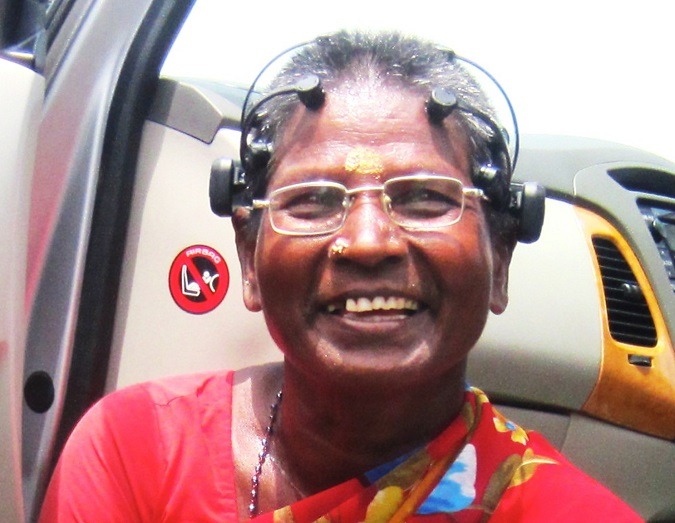Tara Thiagarajan, Founder of Brainnovations Winner Sapien Labs, on building a global platform for brain research that truly captures the diversity of humanity

___
What surprised you the most from the Judges’ questions and feedback during the Brainnovations Pitch Contest?
I was pleasantly surprised to see the significant range and depth of knowledge shown by the judging panel, leading to very specific and useful questions around the key challenges to build our global research platform.
In a nutshell, what is the core idea behind Sapien Labs?
The core idea is to further our understanding of the large differences between individual brains in order to manage our brain health and brain states better. This rests on a global platform called brainbase (brainbase.io) for research collaboration and large scale data aggregation, as well as novel analytical approaches to feature extraction from the EEG signals — we’ve chosen EEG to start since right now it is a very scalable and cost-effective brain imaging technique with the potential to deliver tremendous insights.
When and how did the idea come to you?
I have worked for over ten years on brain signals at various scales (single-cell electrophysiology, LFP, ECOG, EEG), looking to understand structure in the signals with novel analytical approaches such as machine learning, graph theory and others. Over the years this led to various insights to better predict cognitive outcomes, as well as into the enormous divergence of the dynamics across individuals — and how this was informed by context and environment. Understanding individual differences in the brain, how they arise and what they mean is a very nascent endeavor, we are building a platform for data aggregation and analysis that is truly global and representative of the diversity of humanity.
 ___
___
What’s your vision for Brain Health in 2025 and how do you envision Sapien Labs as part of it?
Our understanding of brain health will undergo a major shift by 2025, from subjective symptom-based ‘disorders’ defined through questionnaires to more physiological definitions and personalized treatments. Considering ‘depression’ as a general disorder of the brain, for instance, is a little like treating ‘fatigue’ as a general disorder of the body. There are a myriad underlying causes that will have different diagnosis and treatment when physiologically defined. With the brain as a dynamic and experience-dependent organ, personalized approaches are also going to be important. I envision Sapien Labs as being a key driver of this transition, helping build diagnostic tools and biomarkers through enabling larger, better structured global datasets and a wider array of analytical tools for the brain health and mental health communities.
How are you funding the organization so far, and are you planning to raise funds this year?
Sapien Labs is a 501© 3 non-profit founded in 2016. I have personally committed the funds to build the platform as well to set up the first 100 Neurolabs in Asia, Africa and Latin America. Additionally, we are raising funding through grants for specific projects and to enable Neurolab partners to expand their efforts. We will also build revenue streams in the form of subscriptions for our tools to fund the open access aspects of our platform, as well as enable mechanisms for donation.
How do you/ will you validate that your platform measures and does what it is supposed to?
In general, validation will come in the form of platform usage and volume and quality of data contributions. For specific projects to identify predictive tools, biomarkers and diagnostics, we expect to see retrospective validation first, and ultimately they will have to be put to test prospectively through clinical or non-clinical trials.
 Tell us a couple exciting things you’re planning for 2018
Tell us a couple exciting things you’re planning for 2018
2018 is going to be exciting to watch. We have about 70 labs using Brainbase in beta right now but will officially open our platform to the community this year, with help from the neurolab partnerships we initiated last year. We are also planning ways for the general population to get involved and contribute their brain activity, which I think will be fun.
What are some key roadblocks ahead, and how are you planning to address them?
The way science is structured today does not encourage data sharing. This is both cultural as well as driven by the incentives of academic career progression that place emphasis on authorship order and fast publication over good, clean data, which few people bother to look at or evaluate in peer review. There are also issues around IRB approvals, which have commonly opposed open data sharing, even when anonymized. We need better policies to balance scientific progress with privacy concerns.
We do hope to play a role in this debate by building better ways to encourage data sharing — for example we have taken anonymization very seriously in how we handle data in our platform and have built-in anonymization tools. We are also building in public sharing of data as part of our funding agreement for our Neurolab partnership network.
If you could go back in time to, say, 5–10 years ago, what advice would you have liked to receive?
I would say you never know how things will come together or what new opportunities will present themselves, so just keep at the things that truly interest you.
Finally, if I may, what do you do to stay sharp :-)
I stay off social media almost entirely and also try hard not to get caught up with the daily news cycle; this helps me get to more focused states where I can keep concentration on long-form content with greater depth. I also pay attention to diet (no sugar), regular exercise and meditation.
___________________________________________________
Tara Thiagarajan is the Founder & Chief Scientist of Sapien Labs. Her interest lies in understanding large-scale human systems and has worked on new analytical approaches to brain signals (LFP, ECoG and EEG) for over a decade. She has a BA in Mathematics from Brandeis University, an MBA from the Kellogg School of Management at Northwestern, and a Ph.D. in Neuroscience from Stanford University. She is also an Advisory Group Member for Ashoka’s Changemakers initiative.
Thanks to her great pitch and answers during the 2017 SharpBrains Virtual Summit (slidedeck available below), Sapien Labs was selected as the Top Brainnovation harnessing Big Data.


